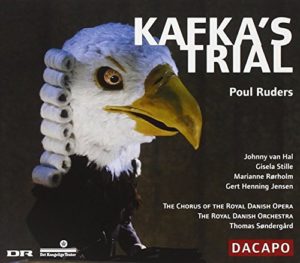
Opera Profile: Kafka’s Trial
By John Vandevert“Kafka’s Trial” (Proces Kafka) was a co-commissioned, one-act opera and prelude written by Danish composer Poul Ruders and British actor and librettist Paul Bentley to celebrate Copenhagen Opera House’s new operatic season.
Poul Ruders is best known for his topical and fantastic operatic themes such as “The Handmaid’s Tale” (1990), which made a resurgence thanks to The English National Opera’s recent restaging, and “The Thirteenth Child” (2016).
The opera’s central theme and the libretto were formed from a reworking of 20th-century novelist and short-story writer Franz Kafka’s unfinished novel “The Trial (1925),” along with infusions of personal letters and writings detailing his relationship with fiance Felice Bauer and pen-pal Grete Bloch, who he started an illicit engagement with during his relationship with Bauer.
The English language version of the opera was prepared by Bentley, while a Danish version was prepared by Danish librettist and translator Karen Hoffmann. The premiere was conducted by Danish conductor Thomas Søndergaard and creatively directed by Mexican director Francisco Negrin.
Reviews of the opera were mixed, Eva White of Christian Daily praising the ingenuity of Ruders and Bentley’s plot and creative vision although chastising the work’s subpar pronunciation of the Danish language by the singers.
Anthony Tommasini of The New York Times, however, praised the team’s employment of personal letters as a way to combine the fictional story with Kafka’s actual life. He especially praised Ruder’s musical scoring, finding his eclectism and musical animism to be akin to neoclassical composers such as Sergei Prokofiev and Dmitry Shostakovich in his usage of instruments for depictions of humor and grotesqueness.
Andrew Clements of The Guardian likewise praised the musical score and staging but thought the work fell flat.
As of 2022, there has been no attempt to revive the opera nor perform excerpts of the work, and it can be assumed that the work was created as a one-time performance. In 2019, Phillip Glass made his own opera called “Trial,” which was then premiered at Opera at the Castle in Szczecin.
Plot
The opera’s plot is broken up into three sections.
The first part details Franz Kafka’s initial relationship with Felice Bauer, where he wrote her nearly two years’ worth of letters. He imagines what her reactions will be when she reads them. The contents of the letter detail his romanticization of her yet his intrepid selfishness, as, during their correspondence, he would begin a relationship with Greta Bloch, albeit only through letters at first. They would eventually begin a sexual relationship in 1914, the same time when Bauer and Kafka became officially engaged to each other.
In the second part, Kafka continued his correspondence with both women. He begins to feel guilty, and so The Trial’s reference begins. The theme of the unfinished novel centers around the protagonist Josef K and his commensurate guilt for a crime that he is not aware of nor whose prosecutor cannot be seen or identified. While Josef K is never found guilty of anything, his conscious tells him otherwise, and he descends into a delirious, paranoid state. He ends up assaulting a woman, and this is mapped onto Kafka’s own guilt at being sexually pursued by Greta while being engaged to Felice.
The opera’s final section is a showdown between Greta, Felice, and Kafka, where they all meet in a hotel room, and Kafka’s actions are revealed to the women. His fear of being seen as weak and inept sits opposed to the greatness of his writing career.
Listen
Scene 12: The Tribunal (July 12th, 1914: Kafka, Greta, and Felice) – Dacapo Records
Categories
Opera Wiki

